Starting an online business is the need of time. The first thing is it costs ways less than other brick-and-mortar stores. To start, there are many eCommerce platforms out there, and you have to find which can be the best eCommerce platform for your startup.
According to Jeff Bezos in a letter to shareholders, Amazon has over 100 million Amazon Prime members.
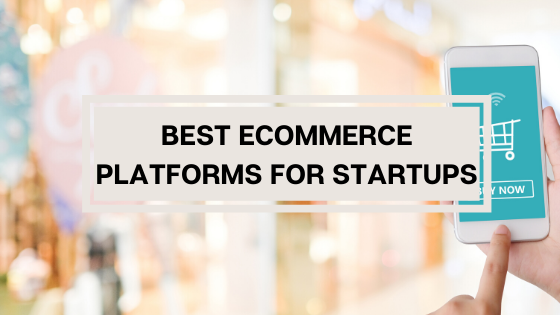
More and more people are coming online to shop. Even brick-and-mortar stores are creating their online stores. So if you already have a store, you may be thinking of starting an online store to cash on growing online shopping habits.
If you want to start selling digital products, physical products, or drop shipping businesses, you will require an eCommerce platform to make this happen.
There are many options, and the one you choose will depend on your store’s needs. Also, many of these platforms have different pricing plans.
Check out these most popular eCommerce platforms to see which suits you best.
Best eCommerce platforms for startups
1. Shopify

Shopify is considered the best eCommerce platform with everything a small business owner needs for an online store. If you are thinking of starting a store, you might have heard of Shopify.
It is easy to use and can help you build your store by choosing free and paid themes. In addition, if you have a website, you can integrate it with your existing website.
You can sell on Shopify both with your website and in-person with Shopify POS( Point of sale)
The best part is you can use it for free for 90 days, and if you promote your business very hard and you make a sale, you can go for the paid plan. Shopify has different paid plans according to your needs.
Shopify plans
You can use Shopify for free for 90 days for a trial. You can build your store and use all the tools and apps for free during the trial. After that, you can go for paid plans.
Shopify lite: The first one is a Shopify Lite plan at $9/month. If you have an existing website, you can use this plan to sell on your website. In addition, you can sell on your website with a buy button without Shopify hosting.
Basic plan: Basic plan is only $29 and is for beginners. If you are on a tight budget and don’t want to spend much money, then you can start with this plan. Then, with some experience, you can upgrade to the advanced plans.
Shopify: This plan is $79/ month and is great if you already have a business and want to scale it.
Advanced Shopify: This plan contains advanced features to scale up your business. It is $299/per month. In addition, this plan offers higher-level features, customer support, and reports.
What are the pros of Shopify?
- Free features: You will get a lot of free features while building a store with Shopify. When you start building a store, a free theme will be uploaded to your store. You can choose your colors, fonts.
- Great support: Shopify has created a blog where you will get a lot of free information to succeed. Also, they have Shopify Academy, where you can learn from free courses. This is all because Shopify wants you to succeed in your business. In addition, their customer service is available to answer your questions as quickly as possible.
- Easy to start: It is easy to create a store as there is a shallow barrier to entry. They provide SEO features like customizable headlines, titles, and meta tags, making it easy to rank on Google.
- Easy to use mobile app, which helps a lot because most the people buy from their mobile phones
Cons of using Shopify
- Shopify alone will not make your store successful, and you have to do hard work to make it a success.
- There is a transaction fee.
- It doesn’t support other currencies and uses third-party apps for that.
Sign up with Shopify for free trial
2. BigCommerce
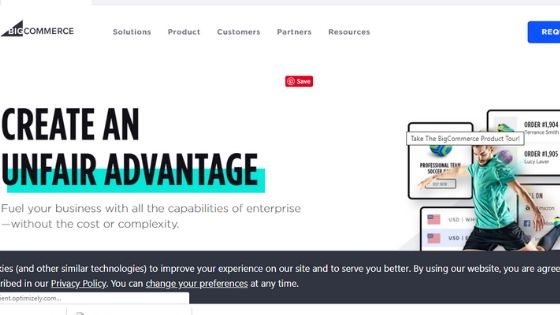
BigCommece is a good option if you want to start an online store. It has great SEO features, around 65 integrated payment gateways, and 24/7 customer support, and you can quickly scale your business on BigCommerce.
BigCommerce price plans
Standard plan: It is the cheapest and costs $29.95/month. It comes with unlimited products, bandwidth, and file storage. This plan is good when you are just starting.
Plus plan: It is $79.95/ month. This one is the most famous plan of BigCommerce. There are no transaction fees, and you get most of the advanced features, including abandon cart feature.
Pro Plan: At $299.95, this one is for bigger stores for a lot of sales and more products. The abandon cart feature is also included in this plan.
Enterprise: This plan is for enterprises that want customised solutions.
Pros of the Bigcommerce
- It is easy to use as Bigcommerce has added a store design feature. It allows you to see the changes as you edit the store.
- It has good SEO features.
Cons of the Big Commerce
- Advanced features sometimes make it difficult to use for beginners
- Complex terminology and a steep learning curve
Sign up with Big Commerce here
3. WooCommerce
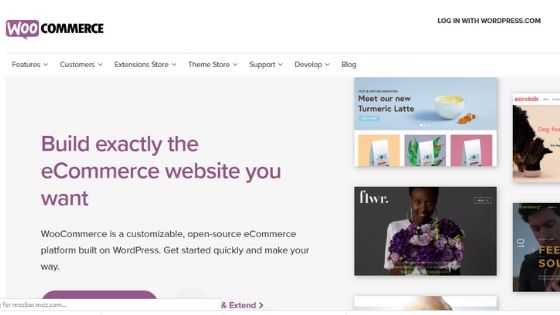
WooCommerce is what WordPress is for bloggers. WoooCommerce can be integrated with WordPress to build an online store. WooComerce powers nearly 74 million, 25% of the online stores.
It is open-source, easy to edit, and highly customizable. Also, it is free to use with your WordPress site. Actually, it is a free plugin, but if you want advanced features, you have to pay for extra plugins.
When you install WooCommrece, it will install more plugins with it. This is one of the drawbacks as plugins slow down the website.
Pros of the WooCommerce
- It can be used with WordPress and is free
- Easy to customize and edit
- You can make your store look like what you want
Cons of the WooCommerce
- It doesn’t come with hosting, and you will require a hosting plan
- Though it is free to install, its extensions are not free
- Needs some technical knowledge to install word press and WooCommerce
4. 3dCart
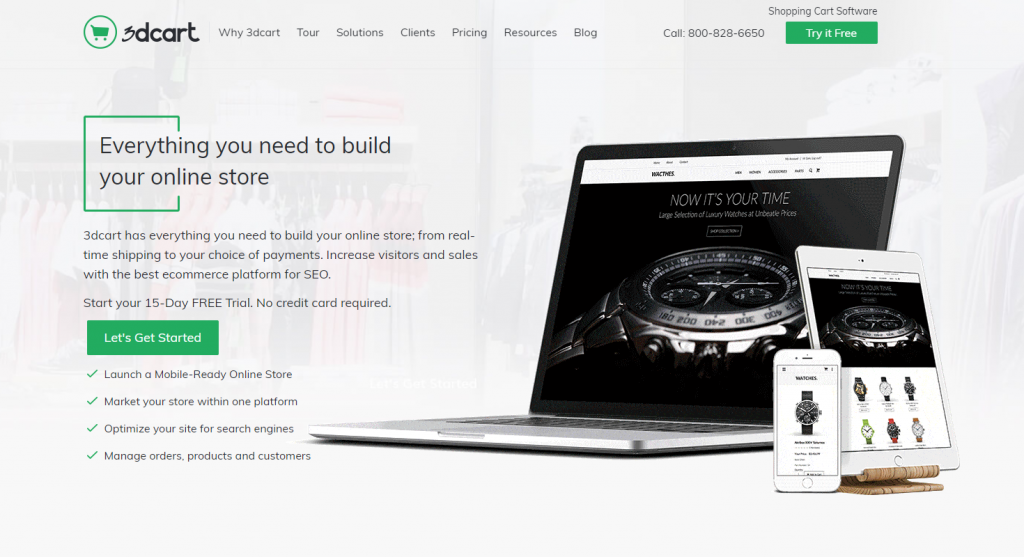
3dCart has been around for 22 years. It is the fastest growing platform having great SEO features, free themes, and 100 payment integrations. In simple words, it has about 200 inbuilt features.
Not only this, but they also have Social media assimilation fast loading speed due to robust SEO. They have a lot of features even on its cheapest plan and come with a robust API( Advanced Programming Integration).
While starting your store, you have dozens of free templates to begin with. With the higher plans, you will get access to more premium templates.
Moreover, it has Built-in Search Functionality, which displays products after running the search.
Pricing
Startup store: It starts at $19/month and provides 50 free templates. Unlimited products, 24/7 support, a Facebook store, and no transaction fee.
Primary store: $29/month and includes all the features.
Plus store: $79/month, includes most of the advanced features
Power store: This plan is $129/month and is the most popular.
Pro store: This is $229/month and supports 15 staff members.
Pros of the 3dCart
- They have robust SEO and make this tricky subject easy and manageable
- Their starting plan is cheap at $19/month
- A lot of additional functionality apps in their app store
- No transaction fee
- Its network security software is Visa PCI DSS Compliant which means credit card payments can be processed without compromising security.
Cons of the 3Dcart
- It will be difficult for newbies to explore
- Its interface is oversaturated, and it takes some time to get used to it.
5. Volusion
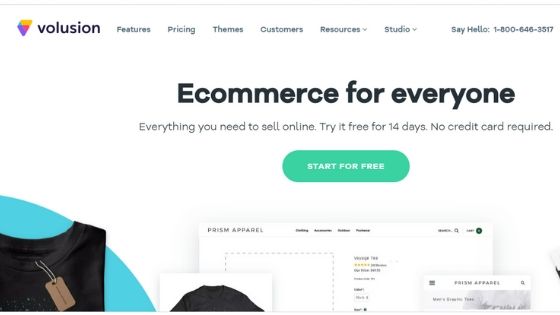
Volusion was started in 1999 in Texas, the US, by Kevin Sproles. More than 180,000 entrepreneurs have built their stores on Volusion. They have more than 200 people to support and help grow your business.
The platform has SEO, Social media integration, and POS integration marketing functionality.
Pricing plans:
Personal: At $29/month, you can earn up to $50,000/year with 100 products. One staff account, unlimited bandwidth, and online support.
Professional Plan: This one is $79/month which includes all other features and sales up to $100,000 with 5000 products and five staff accounts.
Business plan: The business plan is $299/month and provides unlimited bandwidth, unlimited products, and sales up to $500,000.
Prime plan: This one is custom designed and gets VIP support, including all other features.
Pros of the Volusion
- Drag and drop builder with many themes ( 11 of them are free)
- Social selling.robust SEO, other marketplace integrations with higher plans
- 24/7 live chat support
Cons of the Volusion
- Pricing is a bit confusing
- Premium themes are a bit confusing
- You have to pay for an SSL certificate, which is accessible on other platforms
6. Squarespace

Squarespace was started in 2003 and is excellent for simple stores. It has a sleek design and is not very expensive on the basic plan. In addition, it is super easy to customize without any coding knowledge.
It is a one-stop shop where you can have a blog and sell physical products and downloads. Moreover, customers can leave comments at checkout.
Also, you can get detailed reports about your sales and site analytics. It is also integrated with ShipStation to fine real-time calculations of shipping prices to different locations.
Pricing plans
Personal: $16/month and 25% off if billed annually.
Business: $25/ month and 25% off when billed annually. This plan comes with more advanced features.
Basic Commerce: This is $34/month and 13% off if billed annually. This plan provides you with powerful merchandising tools and analytics.
Advanced Commerce: At $52/month, this plan gives you access to all of the features of Squarespace and automatic abandon cart recovery.
Pros of the Squarespace:
- Good choice of eCommerce and marketing tools
- Easy to use
- Good value for the money
Cons of the Squarespace
- A limited selection of payment system
- Not for dropshipping
- No app store for advanced and added features
7. Wix
Wix is not considered very SEO-friendly eCommerce platform, but it is a good choice for beginners to start a simple store. It is a simple drag-and-drop website builder. If you already have a website with six, you can always upgrade to store functionality.
This platform comes with unlimited bandwidth and
Pricing plans:
Business basic: 418/month. This plan allows you to accept online payments and comes with unlimited bandwidth and 20 GB of storage.
Business Unlimited: $28/month. This plan is for entrepreneurs to grow their businesses further. This plan includes unlimited bandwidth, 35 GB storage, free domain for one year, professional logo, and social media logo files f.
Business VIP: $38/month. This one comes with all other functionalities included in different plans and VIP support if you get stuck somewhere.
Pros of Wix:
- Unlimited bandwidth and online payment options.
- It is incredibly flexible and easy to use
- Hundreds of templates to choose from
Cons of using Wix
- Tracking and analytics require paid plans
- Premium plans are single-site plans
8. J2 Store
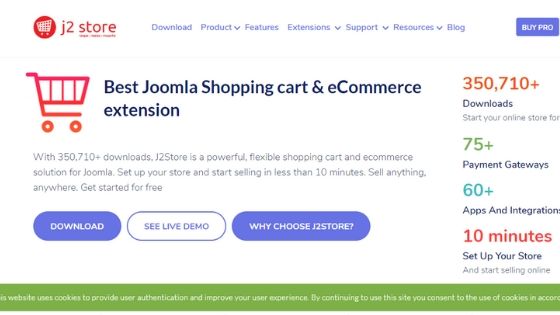
J2store is the best Joomla shopping cart and eCommerce extension. This one is great if you are using Joomla as your CMS. It is easy to set up, and you can set it up in under 10 minutes.
It is compatible with more than 75 payment options. Their website says that they have 350,710 downloads and 60+ app integrations.
Pricing plans:
Professional: $49 for six months. This one comes with support for six months for one website. In addition, you will get a free Paypal plugin for this one.
Developer: $99 for one year. This one is suitable for designers and professionals and comes with support and update for three sites for one year.
Pros of J2store
- Easy to use
- Price is affordable
Cons of J2store
- It can be used with Joomla only
- It comes with only basic features
11 Weebly

Weebly is the best solution if you want a simple store and is new to online selling. It is a good choice for people who want to sell physical products. Unfortunately, you cannot sell digital products on Weebly.
This eCommerce platform is not as sophisticated as others, but it is evolving daily. And can be a platform of your choice if you are starting.
Pricing plan
Its price plan starts at $0, which is a free plan.
Basic plan: $9/month is fundamental and will let you connect a custom domain name.
Professional Plan: This one is $16 per month for businesses. This plan is great for freelancers and service providers and is excellent for promoting your business online.
Advanced: At $29/month, this plan is ideal for online stores. It can send abandoned cart emails.
Pros of using Weebly
- It is easy to use
- Many free templates and even paid ones are less expensive.
- Abandon cart emails are the best I found.
Cons of Weebly
- Not very good at SEO
- It can list only a few products
- Very basic management features
10. Salesforce Commerce Cloud (Demandware)
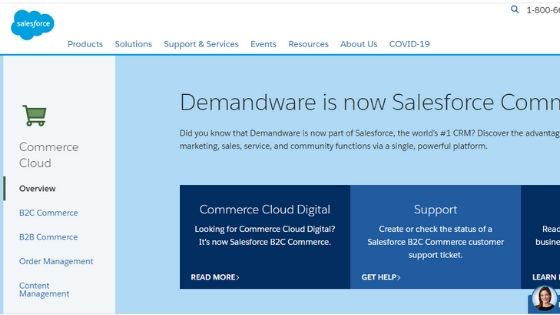
Salesforce commerce cloud, earlier Demandware, has all the features required for a fully functional eCommerce platform. As a result, it is the platform giant multinationals use to handle millions of dollars in sales.
This one is a bit complicated platform but can be integrated with any other salesforce product. Additionally, it can incorporate any business application, whether B2B or B2C.
This is a good option if you want CRM and eCommerce together.
Pricing Plans: Their pricing plans depend on the merchandise. Contact them if you want to use this platform.
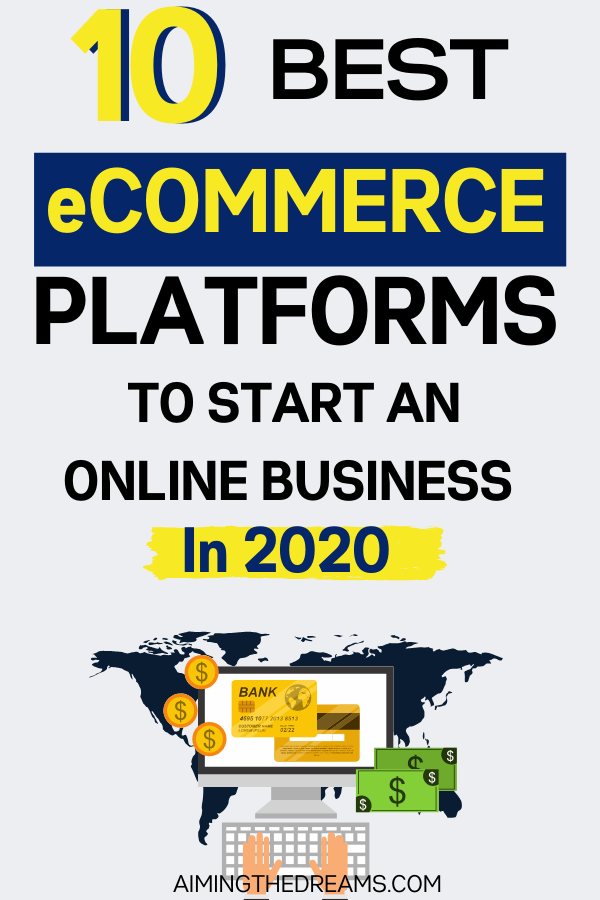
If you want to find the best eCommerce platform for your startup, look for the functionalities you are after.
It should be able to provide all the necessary features required for your store.
Related
How to start a business with less money
Nine side jobs to earn $50,000 per year working from home
I hope these will help you find the right solution for you.
